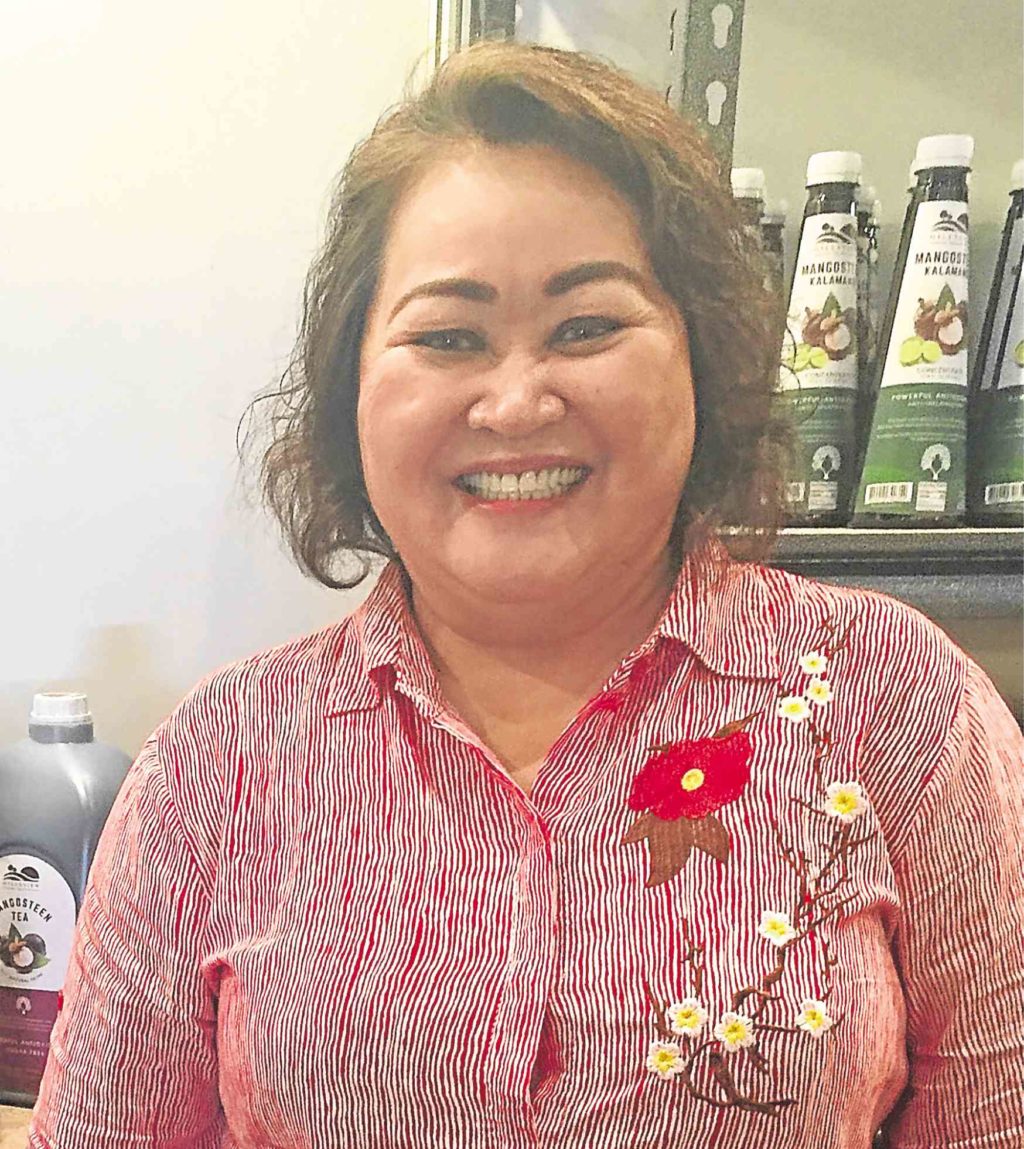Like a beautiful rainbow that comes after a rain, a new business opportunity came to a farm owner in Agusan del Sur after the onslaught of Typhoon Pablo in 2012—all thanks to 60 uprooted mangosteen trees.
Irenea Hitgano, former mayor of Trento who runs the 20-hectare Hillsview Farm in the same town, was initially devastated when her trees took a heavy beating from the typhoon.
But then she recalled someone telling her about mangosteen’s medicinal properties, which could be found not just in the fruit, but the entire tree.
“So what I did with the 60 uprooted trees was to get the bark, roots, and branches, boil them, and then serve the liquid as tea to our restaurant’s customers,” says Hitgano, whose main business is running a restaurant and small inn on the farm.
The tip regarding the tree’s healing touch may have turned out to be true, as the 63-year-old was soon being approached by customers with their respective medical-miracle anecdotes.
“Someone came back and said, Ma’am, after two days of drinking the tea, I had blood in my urine. So I asked, what happened? He [said he] asked [a friend] who told him, it’s good that that’s being flushed out—it could be a sign that you have a prostate problem,” recalls Hitgano. “Another customer had her child, who had a heart problem and every two months needed to go to the doctor, drink the mangosteen tea, and suddenly the child’s lab test results started showing improvements. Now that child only goes to the doctor once a year.”
Motivated by such feedback, Hitgano decided to seek help in improving her process of producing mangosteen tea.
She found guidance through the Department of Trade and Industry, as well as the Department of Science and Technology, from which she received a zero-interest loan of around P1 million, which Hitgano used to purchase the needed equipment.
However, due to the destruction caused by Typhoon Pablo—Hitgano’s restaurant also needed repairing—it took Hitgano two years before she could go into full production of mangosteen tea.
She eventually developed two variants: The pure mangosteen tea, with no sweetener or other flavoring and the mangosteen tea with kalamansi.
“Mangosteen with kalamansi… is good for children and younger people, because the pure mangosteen tea is not very flavorful. But it isn’t for diabetics, because it has sugar,” Hitgano says.
The teas, which cost around P400 per bottle, are sold by distributors from Luzon to Mindanao. Hitgano also showcases her products in trade shows. The tea is sold together with a brochure which poses a 21-day challenge to consumers: Drink four glasses a day for three weeks, and one is guaranteed to feel generally healthier.
“The great thing about [drinking mangosteen tea] is that it doesn’t just help with the disease you are trying to get rid of, like, say, diabetes; your uric acid, cholesterol levels will go down, and aches and pains will disappear. It heals the whole body. It makes you youthful again,” she claims. “But if you have a gall stone problem, for example, that won’t go away after just 21 days; you have to keep on taking the tea consistently until the problem goes away.”
More than just a health drink, Hillsview Mangosteen Tea is also responsible for providing employment to farmers and their wives, who work at the factory. Hitgano wants to take this a step further by putting up an alternative learning center for her employees, particularly those who did not finish their high school studies.
“We will help them so they can uplift their status in life,” says Hitgano, who plans to coordinate with the Department of Education to develop the center, and, eventually, state universities, too, so that workers who want to pursue a college degree can do so.
In the meantime, Hitgano, whose 20-ha farm also has a pasalubong center that sells other local items made by microentrepreneurs, already dishes out her own major lesson in business: Divide your life into four financial stages.
“First, from 20-35 years old, your money should come from your work. Then from 35-45, you should have a small farm, or a pedicab or apartment that you’re renting out. Third stage, 45-60 years old, you should have 10 ha of coconut, 10 ha of mangosteen. After that, during the retirement age, you should no longer be stressed; you shouldn’t be working for money—money should be working for you,” she says.
It was because of this piece of advice, which she learned from a seminar years back, that Hitgano’s entrepreneurial spirit was awakened.
Now, she says she’s ready to relax, and her venture into making mangosteen tea, a sideline that’s become one of her main businesses, is adding to her enjoyment of retirement. Her eyes twinkle as she tells us how her tea doesn’t just make for good business—as with her clients, Hitgano has also benefited from drinking her product.
“Before, I couldn’t walk around a mall for a whole day; I would run out of breath easily. Now, [after drinking the tea], I can easily do it! My blood sugar levels used to be high, almost borderline [diabetic]; now they’re normal. Even my cholesterol levels are normal,” she says. “I used to have a fatty liver for 15 years. I wasn’t sick, but tests always showed that I had a fatty liver. That went away after I drank the tea. I couldn’t believe it at first, but when I repeated the tests, they all showed normal results.”


